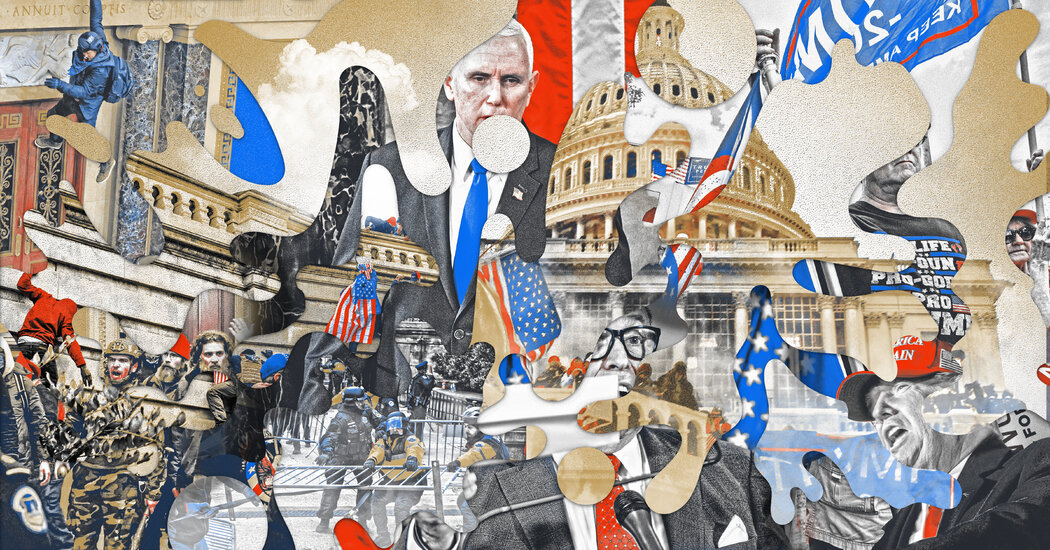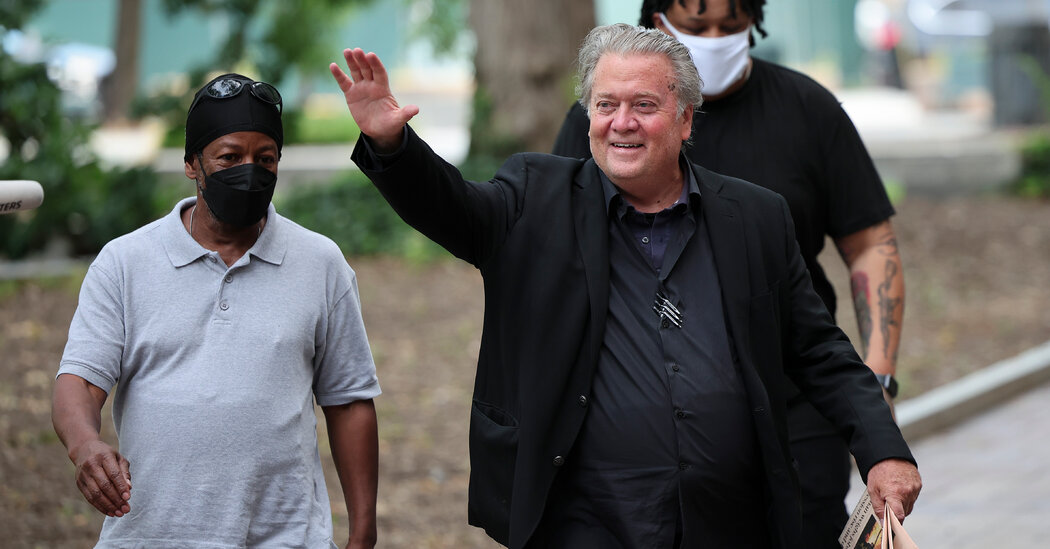
At 3 p.m. on Sunday, Jan. 3, 2021, Jeffrey Clark, the acting head of the Justice Department’s civil division and an expert in environmental law, strode into the conference room of his boss, the acting attorney general, Jeffrey A. Rosen, who had taken over weeks earlier from Mr. Barr.
Mr. Clark was there with some remarkable but by that point not entirely surprising news for Mr. Rosen: Mr. Trump had offered Mr. Clark the job of running the Justice Department, effective that day. Mr. Rosen, according to an account he gave the Senate Judiciary Committee, could stay on as the No. 2 if he wished. Mr. Rosen replied that he was not about to be fired by a subordinate and said he would take the matter directly to Mr. Trump.
The maneuvering for control of the Justice Department was a closely held secret at that point, but it underscored the lengths to which Mr. Trump was willing to go to forestall his defeat.
Over the span of several weeks, a battle raged among camps inside the administration and among allies of Mr. Trump over who would lead the Justice Department at a moment when it was under intense pressure from Mr. Trump to do more to investigate and validate his wide-ranging and unsupported claims that he had been robbed of re-election by fraud.
And over a few tense days, Mr. Trump brought to a head a plan that would have pushed aside Mr. Rosen, who had refused the president’s entreaties, in favor of Mr. Clark, a loyalist who was eagerly promoting steps including having the Justice Department send Georgia officials a letter stating that voter fraud allegations could invalidate the state’s Electoral College results — a message with no basis.
Mr. Barr had earlier dismissed allegations of widespread fraud, but Mr. Trump was not about to give up. He and his allies, including a band of Republican House members and several conservative lawyers, contacted Justice Department leaders nearly every day leading up to Jan. 6, sometimes multiple times a day, with demands for fraud investigations and other steps to overturn the election.
Representative Scott Perry of Pennsylvania, for instance, worked with Mr. Clark to try to persuade Georgia officials to withdraw the state’s results. Others pushed the department to bring the fight to the Supreme Court.
The pressure campaign ramped up on Dec. 14, the day Mr. Trump announced that the department’s then-No. 2 official, Mr. Rosen, would replace Mr. Barr. An aide to Mr. Trump emailed Mr. Rosen talking points about voter fraud in Michigan and problems with Dominion Voting Systems machines, the first of many fraud conspiracy theories that Mr. Rosen and his team would examine and debunk.
The next day in the Oval Office, Mr. Trump pressed Mr. Rosen to appoint a special counsel to investigate Dominion’s voting machines and other issues. He wanted the department to support lawsuits that sought to overturn the election. Mr. Rosen rebuffed the requests, as he would for the next 19 days, reiterating Mr. Barr’s statement that there was no widespread fraud.
Mr. Trump said that the Justice Department was not fighting hard enough for him.
Mr. Rosen and other department officials hoped that the facts would eventually persuade Mr. Trump to acknowledge his loss. They had no idea that Mr. Perry had secretly introduced the president to Mr. Clark as the Justice Department ally he had longed for, one who would put the department to work disputing the election results.
Inklings of deeper trouble came on Dec. 27, when Mr. Rosen and his top deputy, Mr. Donoghue, told Mr. Trump that no evidence supported the lawsuits he had filed in an attempt to overturn the election. Reports of corruption in swing states had not been borne out.
Attorney General William P. Barr said publicly in December 2020 that he had “not seen fraud on a scale that could have effected a different outcome in the election.” Anna Moneymaker for The New York Times
Mr. Trump countered that the department could “just say that the election was corrupt,” and leave the rest to him “and the R. Congressmen,” according to notes from the call. Mr. Donoghue testified that the “R” referred to Republicans, some of whom were already working to undermine public faith in the election.
Giving a hint of his intentions, Mr. Trump said that “people tell me Jeff Clark is great, I should put him in,” Mr. Donoghue later testified. That day, Mr. Perry also called Mr. Donoghue to tell him that Mr. Clark could “do something” about the president’s claims.
During tense conversations with Mr. Clark, Mr. Rosen and Mr. Donoghue learned that he was working on a plan with Mr. Trump’s allies to overturn the Georgia results. He asked Mr. Rosen to send the proposed letter falsely informing Georgia state officials that a federal investigation could invalidate the state’s results. Mr. Rosen refused.
At the White House, the president’s chief of staff, Mark Meadows, briefed Mr. Rosen and Mr. Donoghue on a conspiracy theory known as Italygate, which baselessly claimed that people in Italy had used military technology to remotely tamper with voting machines in the United States.
By New Year’s Eve, Mr. Rosen and Mr. Donoghue had grown deeply concerned. They had rebuffed outlandish demands to lobby the Supreme Court, appoint special counsels and give credence to wild conspiracy theories. But they struggled to handle Mr. Clark, who wanted a department official to falsely say at a news conference that fraud inquiries had cast doubt on the election result.
Mr. Rosen and Mr. Donoghue forbade him to talk to Mr. Trump.
On Jan. 2, Mr. Clark revealed that he had secretly conducted a witness interview in connection with an already-disproved election fraud allegation. And he raised the prospect with Mr. Rosen that Mr. Trump could install him as acting attorney general, but he offered a deal: He would decline any such offer if Mr. Rosen would send the sham letter to Georgia state officials. Mr. Donoghue shut down the plan.
Mr. Clark then secretly spoke with Mr. Trump, in defiance of orders. On Jan. 3, he informed Mr. Rosen that the president intended to replace him with Mr. Clark.
Unwilling to be pushed out without a fight, Mr. Rosen worked with Mr. Cipollone, the White House counsel and an ally, to convene a meeting with Mr. Trump for that evening, a Sunday. Before going to the White House, Mr. Donoghue hosted a conference call with the department’s top seven or eight leaders, laying out Mr. Clark’s machinations and Mr. Rosen’s upcoming fight for his job.
Should Mr. Rosen be fired, he asked, what would the group do?
Shocked, the officials unanimously agreed to resign en masse if Mr. Rosen was forced out. Their plan brought to mind the Nixon era’s so-called Saturday Night Massacre, when Attorney General Elliot L. Richardson and his deputy resigned rather than carry out the president’s order to fire the special prosecutor investigating him.
The showdown that played out at the White House that evening was extraordinary even by the standards of the Trump administration. Mr. Trump opened the Oval Office meeting around 6 p.m. with a blunt statement: “One thing we know is you, Rosen, aren’t going to do anything to overturn the election,” Mr. Trump said, according to Mr. Rosen’s later testimony.
Justice Department officials unanimously agreed to resign en masse if Jeffrey A. Rosen, the acting attorney general, was forced out. Pool photo by Yuri Gripas
Mr. Cipollone called Mr. Clark’s plan to send the proposed letter to Georgia a “murder-suicide pact,” participants in the meeting later testified. The officials warned that firing Mr. Rosen would spark a mass resignation, and that Mr. Clark would lead a depopulated agency.
In a heated moment, Mr. Donoghue said that Mr. Clark “wouldn’t even know how to find his way” to the F.B.I. director’s office and was “not even competent to serve as the attorney general,” he later told investigators.
When Mr. Clark protested, Mr. Donoghue told investigators that he snapped. “You’re an environmental lawyer,” he recounted saying to Mr. Clark. “How about you go back to your office, and we’ll call you when there’s an oil spill.”
Only in the final stages of the roughly three-hour meeting did Mr. Trump relent. The plan to install Mr. Clark atop the Justice Department was shelved, and the letter to Georgia officials was never sent.
But Mr. Trump was still not ready to let go of his election fraud claims. He said that he would fire the U.S. attorney in Atlanta, who quit upon hearing about the threat. Soon after the end of the Oval Office meeting, Mr. Donoghue recounted to Senate investigators, Mr. Trump alerted him to a report that a Department of Homeland Security agent had found a truck filled with shredded ballots near Atlanta.
The Justice Department, the F.B.I. and the Homeland Security Department later concluded that the only ballots to have been destroyed were from previous elections, and had been cleared out to make room for storage of the 2020 ballots.
Thwarted in his attempt to execute a hostile takeover of the Justice Department, Mr. Trump and his team still had another strategy to turn to.




